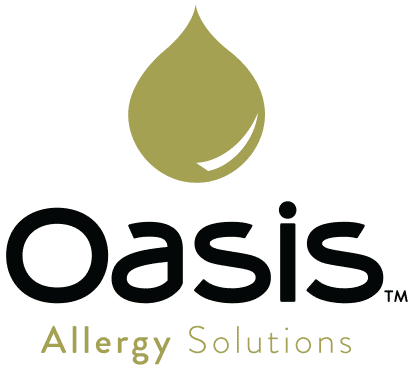
Oasis Allergy Testing Information For Patients
Allergies and Treatment
Allergies are a very common problem and it is estimated that one in six Americans is affected with
symptoms that range from simply annoying to severe. An allergy is an inflammatory response caused by
a sudden or repeated exposure to an allergen.
Normally, developing an allergy happens in two stages. In the first stage, once exposed to an allergen, your body may create IgE mediated antibodies which adhere to circulating basophil or mast cells. At this time, you may become sensitized while remaining asymptomatic. In the second phase or during sensitization, additional exposure results in a symptomatic response, i.e. the release of chemicals such as Histamine, Prostaglandins or Leukotrienes resulting in bothersome symptoms. Symptoms are most often localized such as gastrointestinally, in your eyes or sinuses. Fatigue, loss of taste and coughing are common as well.
The two primary causes of allergies are genetic predisposition and/or previous exposure during the course of your life, clearly things you had little if any ability to control. In an ideal world, one might avoid symptoms all-together if you could rid your world of offending allergens. Unfortunately for most, this is an unrealistic solution (although limiting exposure in obvious exposure environments should certainly be a goal). Many turn to medications which address the symptoms and provide temporary relief but are not curative. For many of those with allergies, it is a chore simply getting through each day!
Happily, there is a solution that doesn’t just treat the symptoms but eliminates underlying causes of your body’s allergic reaction. Immunotherapy strengthens your immune system by gradually introducing increased dosages of the allergen over a three to five-year period. Immunotherapy is in many respects very similar to the flu shot you may get each year.
Once you have been tested and determine what allergens you may susceptible to, your provider can begin therapy just a few weeks later with a regimen that is tailored specifically for you! It is important to note that should you begin therapy, you will likely feel much better after a few months. It is imperative that you complete the program and the full course of treatment. Failure to do so may mean the return of symptoms and even more unfortunately, if too much time has lapsed, you will likely have to re-start therapy from the very beginning. (You may be tested annually to monitor and report on your progress). Treatment is typically a 3-5 year program.
Who Is Eligible?
Patients over the age of three may be tested and treated. Those younger than three typically haven’t been exposed to enough allergens to make testing and treatment worthwhile. There is no upper age limit for this program, however, if you are elderly, you should discuss with your doctor the risks vs. benefits of treatment.
Patients who are pregnant should postpone testing and treatment. If you become pregnant after starting immunotherapy and have reached maintenance stage, you may safely continue treatment.
For patients with autoimmune disorders, testing may result in adverse effects. Please notify your doctor or staff if this applies to you and they can discuss your options.
Patients with unstable asthma are at increased risk for anaphylaxis and treatment is discouraged. You may be tested as long as you are not in an asthmatic event at the time of the test. Likewise, patients susceptible to or with a history of anaphylaxis should be blood tested. Please be certain to tell your doctor if you have either of these conditions.
Preparing For Your Test
There is little you need to do prior to testing other than signing a consent form. It is best to wear a top that will provide easy access to your upper and lower arm. A tank top is ideal if possible.
You may continue to use intranasal allergy sprays such as Flonase, Nasonex, etc. You may also use your asthma inhaler as needed.
Please do not exercise for two hours prior to testing and we recommend you wait two hours after testing before resuming strenuous activities.
You may not take any medication containing antihistamines 48 hours prior to testing. If you are on a beta-blocker, blood testing is recommended.
If you arrive the day of your test and have taken anything in error, please notify you doctor prior to testing so that they can re-schedule.
Testing
Testing consists of superficially “scratching” your skin with low-level doses of antigens to determine the severity of your allergies. That is done by measuring the wheel, flare and redness of the site of each allergic response. Allergic reactions will present as something like a mosquito bite with a red circle.
In addition to testing you for allergens we will utilize two control substances to ensure test accuracy. Histamine, which typically causes a skin reaction and Glycerin. Histamines should cause a skin reaction and Glycerin should not (all allergens are glycerin based). A positive for Histamine and a negative for Glycerin indicates valid testing results.
You will be tested for several families of allergens including foods, animal dander, trees, weeds, grasses, molds, and dust mites. The test takes approximately 30, 15 minutes of which are waiting as your body responds. You may feel an itching or burning sensation but it extremely important that you do not scratch the tested area as this could void the test. After testing is completed and the results are recorded, staff will wipe down your arm with alcohol and apply anti-itch cream if necessary. Most patients will experience a gradual decrease of discomfort and a full cessation in 30-60 minutes. On rare occasion, swelling may reoccur 4-8 hours after testing. This is not a serious issue. Apply anti-itch cream or a cold compress and symptoms will diminish over the coming week. Should this occur, please measure the swelling, and report this to your doctor on your next visit. Although a very, very rare occurrence, some patients may experience a severe, immediate reaction. Staff will assist you in the event this happens. Should you develop a severe reaction in the days that follow, please notify your doctor immediately.
After the test
The wonderful thing about allergy skin testing is that staff will review the results together with you before you leave the office! Your doctor will provide you with a list of the allergens you tested positively for (if any) and during this same visit, can discuss treatment options!
The road to relief from your allergies symptoms can start as soon as you are tested!
Please click here for a physician referral for help with your allergies.
Learn More About Our Turnkey Allergy Program and How It Can Benefit Your Practice

888-906-2715 Office 405-702-0586 eFax
888-906-2715 Office
405-702-0586 eFax